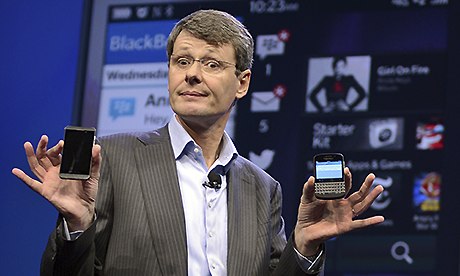
Struggling smartphone maker BlackBerry has fired its chief executive and abandoned a $4.7bn (£3bn) rescue bid from its largest shareholder as it turned to a $1bn fundraising plan in a battle to stay afloat.
Thorsten Heins, brought in to run the company in January 2012, will leave with a $22m payoff, and be replaced by John Chen, a seasoned technology industry executive. The surprise move by BlackBerry indicates that it has failed to find a buyer for the company after a six week process in which it has discussed deals with industry powerhouses including Google, Cisco and Facebook.
The company said it will raise $1bn in convertible bonds instead of pursuing a deal with Fairfax Financial, its 10% shareholder. Fairfax, whose ability to raise the financing for its $4.7bn bid was widely questioned, has pledged to buy $250m worth of the bonds.
The company, which has endured a rapid fall from grace, did not say why it was trying to raise the extra money amid predictions that it will burn through its $2bn cash pile within 18 months. Its last quarterly results showed revenues and handset sales plunging and it is trying to cut costs by firing almost a quarter of its staff. BlackBerry controlled close to 50% of the handset market in the US in 2009 but its share now stands at less than 3% after it buckled under competition from Apple and Samsung.
"This does look like panic stations," said Neil Mawston, executive director at the research company Strategy Analytics. "The trouble is that when a company's in that downward spiral, nobody wants to catch a falling knife – so operators don't want to work with them, and retailers don't want the stock."
BlackBerry's chairwoman, Barbara Stymiest, thanked Heins for his "significant accomplishments" at the company he joined in 2007. His interim replacement Chen is an adviser to Silver Lake, the private equity group that played a leading role in the recent buyout of Dell. In an interview with Reuters, Chen said he had no plans to shut down the company's handset business, thought to be a significant loss maker.
"I know we have enough ingredients to build a long-term sustainable business. I have done this before and seen the same movie before," he said. "BlackBerry is an iconic brand with enormous potential – but it's going to take time, discipline and tough decisions to reclaim our success."
BlackBerry shares plunged by 13% to $6.79, from $7.70 before the market opened, far below the $9 per share that Fairfax was attempting to offer ahead of Monday's bid deadline.
There are growing expectations that the handset business will be severely cut back after market failure of the new BB10 handsets. "BlackBerry needs to use the new cash infusion to change its market approach [to one] where saving the devices business is not the main priority," said Carolina Milanesi of the research group Gartner, which recently advised business clients using BlackBerry to examine alternatives. The new unsecured funding will be in the form of debentures, convertible into BlackBerry shares priced at $10, a premium of 28.7% to Friday's closing price, within seven years.
But analysts remained sceptical about the future of the firm formerly known as Research in Motion. "If you wouldn't lend money to buy BlackBerry, why would you lend money to BlackBerry?" queried Benedict Evans, of Enders Analysis.
BlackBerry was believed to have held talks with a number of companies while Fairfax said it was working on its bid. The bid was announced on 23 September, just after the company had announced disastrous results with a second quarter loss of $965m – largely due to a $934m writeoff on unsold Z10 handsets – on revenues of just $1.6bn.
Among the companies which BlackBerry is understood to have spoken to about a buyout are Google, Cisco, SAP and China's Lenovo. But no bids materialised to challenge the putative one from Fairfax – that itself failed to materialise.
"Looks like nobody was interested in buying BlackBerry outright," commented Avi Greengart, research director at Current Analytics. "The announcement does not even hint at what BlackBerry does next."
Having concluded a strategic review with Monday's short statement, BlackBerry must now rely on the $1bn fundraising and its own finances, having seen former arch-rival Nokia capitulate this year with the sale of its handset business to Microsoft. BlackBerry says it has taken measures to cut costs – but equally could see increasing pressure on margins if its business continues to decline.
The company's cash position could also be hit if suppliers begin demanding payments on shorter terms, which would mean paying cash for components before they can be sold as finished items. One major supplier, Jabil, warned in September that it might stop building parts for the company, which could completely kill off the handset business.

